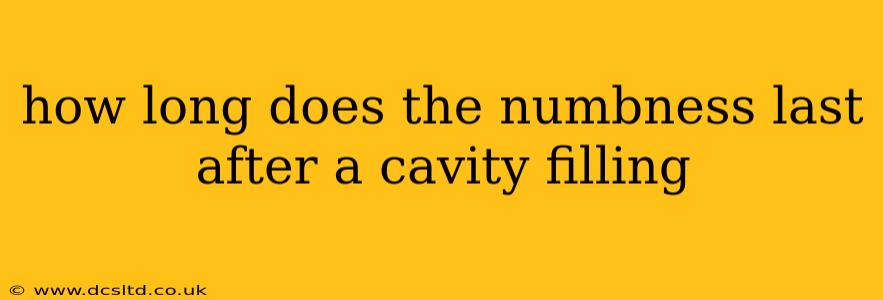Getting a cavity filled is a common dental procedure, but the lingering numbness afterward can be a little unsettling. Many patients wonder, "How long does the numbness last?" The answer, unfortunately, isn't a simple one-size-fits-all. The duration of numbness depends on several factors, and understanding these factors can help manage your expectations and alleviate any concerns.
What Causes the Numbness?
Before we delve into the duration, let's understand why you experience numbness in the first place. Your dentist administers a local anesthetic, usually lidocaine, to numb the area around the tooth being filled. This anesthetic blocks the nerve signals that transmit pain sensations. The effect is temporary, and as the anesthetic wears off, feeling returns to the affected area.
How Long Does the Numbness Typically Last?
Generally, the numbness from a cavity filling lasts between 2 and 12 hours. However, this is just a broad range. Several factors influence the precise duration:
-
Type and Amount of Anesthetic: The type of anesthetic used and the amount injected play a significant role. Stronger anesthetics and larger doses tend to produce longer-lasting numbness.
-
Individual Metabolism: Your body's metabolism affects how quickly the anesthetic is processed and eliminated. Faster metabolisms generally lead to quicker recovery of feeling.
-
Injection Site and Technique: The specific location of the injection and the dentist's injection technique can influence the duration and extent of the numbness.
-
Underlying Health Conditions: Certain health conditions or medications can affect how your body responds to anesthetics, potentially prolonging the numbness.
What if the Numbness Lasts Longer Than Expected?
While most people regain full sensation within 12 hours, it's crucial to contact your dentist if the numbness persists beyond 24 hours. Prolonged numbness could indicate a complication, although this is uncommon. Your dentist can assess the situation and provide appropriate advice or treatment.
What Can I Do While Numb?
During the period of numbness, it's essential to take precautions to protect your mouth and avoid accidental injury:
-
Avoid Hot Foods and Drinks: Your numb area may be less sensitive to temperature, increasing the risk of burns.
-
Eat Soft Foods: Chewing can be difficult while numb, so opt for soft, easily chewed foods.
-
Be Mindful of Chewing: Avoid biting your cheek or tongue accidentally.
-
Avoid Alcohol: Alcohol can interact with anesthetics, so it’s best to avoid it until feeling fully returns.
What Happens if the Numbness Doesn't Wear Off?
H3: Can I drive after a filling with numbness?
No, you shouldn't drive until the numbness fully wears off. Impaired sensation in your mouth can affect your ability to control your vehicle safely, potentially leading to accidents. It's always best to err on the side of caution and wait until you have full feeling and coordination back before driving.
H3: Is it normal to have tingling after numbness wears off?
Yes, some tingling or a slight pins-and-needles sensation after the numbness wears off is entirely normal. This is usually a temporary sign that your nerves are recovering. If the tingling persists for an extended time or is accompanied by other symptoms, it's advisable to contact your dentist.
H3: Can I take pain relievers if I feel pain after the numbness wears off?
Yes, you can take over-the-counter pain relievers like ibuprofen or acetaminophen if you experience any pain after the numbness subsides. Always follow the recommended dosage instructions on the packaging. If the pain is severe or doesn't respond to over-the-counter medication, contact your dentist.
Remember, every patient is different, and the duration of numbness can vary. If you have any concerns or experience prolonged or unusual symptoms, always contact your dentist for advice.
